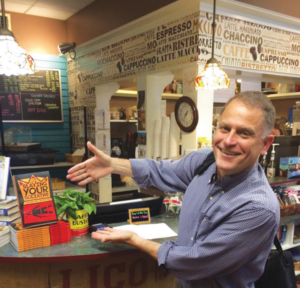In the fall issue of Odyssey, we featured an interview with author John Ohmer, whose book Slaying Your Goliaths: How God Can Help is a wonderful and fresh look at the David and Goliath story and its relevance to our lives. (If you haven’t read that Q&A yet, check it out!)

We wanted to hear more from John, so we caught up with him for a few more questions for the blog. Here’s what he had to say:
1) What makes this book different from others about David and Goliath?
JO: I’d say the first thing that makes it different is perspective, the author’s perspective. Because Slaying Your Goliaths was written by someone who has worked in parish ministry for over twenty years, I think readers will find it to be a very practical book. My job, each time I preach or teach, is to show the daily relevance of the Bible to people: to show them how their faith can help them not just on Sunday mornings, but Tuesday in traffic, on Wednesday while worrying about a work project, and on a Friday while getting together with family. Also, this book takes seriously the fact that the original David and Goliath story was written BY people of faith to people of faith. The hero of this story is not David, but God. And so while it is a very helpful book, it is not a “self-help” book. It is a “God-help” book: how can God help you, like David, overcome the seemingly impossible odds you face?
2) What’s the most compelling part of the story?
That’s the beauty of Bible passages: what’s most compelling about the story will vary so much from person to person. So a high school kid who is being bullied might find the pre-battle taunts, and my observation that “a giant’s greatest weapon are words” the most compelling part of the story. Someone wrestling with difficult family dynamics might find David’s toxic encounter with his brothers—and how David handles his brothers—the most compelling part of the story. Someone struggling to introduce a new idea at work or break through institutional structures or habits might find the “you must reject Saul’s armor” the most compelling. And someone feeling overwhelmed by life’s circumstances will like the part of the story where David compares Goliath not to his own size, but to God’s size.
3) Give us an example of one way the lessons of David and Goliath might impact our lives.
Let’s go back to the example of someone struggling to introduce a new idea at work – someone who is running into institutional resistance, or is being told “that’s not the way we do things around here.” Then re-read the parts of the story where David is offering to fight Goliath, but his offer is being resisted: first by his brothers and then by King Saul. You see two very different reactions by David. In the case of the resistance from his brothers—which is nasty and personal, having nothing to do with the actual issue at hand—David simply walks away, and keeps repeating his offer. In the case of the resistance by King Saul—which is valid and helpful—David makes a careful and persuasive case that God will use his skill and experience and defend him and allow him to defeat Goliath.
And after the case is made, and King Saul agrees to let David fight Goliath, but insists that he, David, do it “his way,” using Saul’s armor, David continues to use wisdom in how he handles King Saul. David tries Saul’s armor on. He walks around in it. Then he diplomatically rejects it by saying “I cannot move around in this; I am not used to it.” In other words, he rejects Saul’s armor—old institutional ideas and customs that worked perfectly well for Saul—without rejecting Saul himself. That’s a masterful lesson in dealing with well-intentioned people who try to force their ideas or systems onto us.
4) What are the best ways to use this book/How do you envision people using this book?
As I say in the book, the best advice I’ve ever seen for reading the Bible—and a book about the Bible—is the advice given hikers: “if you get winded, slow down. If you get bored, speed up.” So the best way to use this book is to read it until something jumps off the page at you, and then slow down or even stop. Savor and meditate slowly on that part. Allow God to speak to you. Go to the discussion questions and spend time with those. Stay there until you start to get bored. Then speed up. Move on through sections until you find something speaking to you again. Then stop again, and savor that part.
The book can also be read in book groups, taking one chapter at a time and using the study guide at the end of each chapter as a way to start good group discussions.
5) Why did you choose Forward Movement to partner with for the book?
Scott Gunn believed in this project from the very first time I floated the idea to him. His passion is to bring resources to people that will make them better disciples: more faith-full followers of the God made known to us in the Bible. And since that—moving people away from being paralyzed by fear and forward toward conquering, with God’s help, their seemingly impossible obstacle—“Forward Movement” was a perfect partner.
Thanks, John! You can learn more or pick up a copy of the remarkable Slaying Your Goliaths here.



